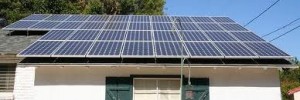Eco Green Facts



 Using Solar Energy in Your Home
Using Solar Energy in Your Home
If you are looking to go green, then adding solar energy to your home is a must. While solar energy has not yet reached the point where you can disconnect from the grid by throwing a couple of panels on your roof, this is a great way to start.
 The most common solar system at use in homes is a grid tied system. This system uses both solar energy and the traditional power grid to power your home seamlessly. This is the most cost effective option, as it does not require large battery banks to store power for when sunlight is not available. The best part about this system is that you can actually sell any excess power back to the electric company. This is simply done by allowing your meter to run backwards at these times, so that when your meter is read you only have to pay the balance of what you have used. The only downside to this system is that you will lose power whenever there is an outage in your area. This is done to make sure your home is not adding power to the grid during this time, as that would endanger any workers trying to correct the problem.
The most common solar system at use in homes is a grid tied system. This system uses both solar energy and the traditional power grid to power your home seamlessly. This is the most cost effective option, as it does not require large battery banks to store power for when sunlight is not available. The best part about this system is that you can actually sell any excess power back to the electric company. This is simply done by allowing your meter to run backwards at these times, so that when your meter is read you only have to pay the balance of what you have used. The only downside to this system is that you will lose power whenever there is an outage in your area. This is done to make sure your home is not adding power to the grid during this time, as that would endanger any workers trying to correct the problem.
If there are a large number of outages in your area than you may want to use a modified system that combines a battery backup with the grid tied system. In these setups, solar energy is used to charge batteries that can be used during an outage without sending power back into the grid, similar to a home generator system. This does cost quite a bit more, so think carefully about whether or not you really need this service before you have it installed.
While rare, full solar systems do exist. Consider your options carefully as you will probably need to greatly reduce your energy usage, or invest a lot of money and space into batteries and panels to make this work. These systems are really only good if you are determined to disconnect from the grid, or in areas where traditional panels are not available. If you are in a populated area then you still may want to use a grid tied system just because you could actually get money back from the power company when you are generating excess electricity, which will help cover your investment.
No matter what you decide to do, be sure to do your research before you get started. Every area has very different laws concerning what you can and cannot install, as well as what incentives may be available to you. You may even have to lobby local government to get your plan legalized before you proceed. Most laws banning solar installations are outdated, and with a little education you should be able to get your project approved.
No matter what your final goals are, solar energy is a great way to reduce your carbon footprint. Better yet, by purchasing green projects you are telling companies that you are willing to spend money on green products. Even if they are not environmentally conscious, most companies will pay attention to what people want to spend money buying.

